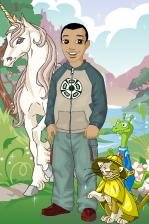Robert Moore Williams' "The Sound of Bugles" (short story)
Collected in.
- Donald A Wollheim (ed)'s "Adventures on Other Planets".
Fact sheet.
First published: Startling Stories, September 1949.Rating: B.
Related: Stories of Robert Moore Williams.
Looking for free fiction, good stories, funny stories, recent fiction, or best of 2013? More options on side bar.
Found a broken link? May be the story can still be found.
 According to Wikipedia, "It was the first published anthology to present the best science fiction stories for a given year. The stories had originally appeared in 1948 in the magazines".
According to Wikipedia, "It was the first published anthology to present the best science fiction stories for a given year. The stories had originally appeared in 1948 in the magazines".
All at Internet Archive in multiple formats:
A few days after the little alien ship with a dead mouse as the sole passenger landed in the middle of a city, widespread destruction began happening world over - assassinations of heads of governments, bombings of population centers, ...
Bill Wheeler has an idea that landing of the ship is somehow linked to increasing chaos. In fact, he seems to have an idea of how exactly...
 The most interesting thing about this story is the weird emotions it invoked: it made me sympathize with one of the most despicable kind of politician - one who thinks the laws (s)he makes are only for ordinary people; he himself is above law. We have just too many such in India; I guess most democracies will have their share.
The most interesting thing about this story is the weird emotions it invoked: it made me sympathize with one of the most despicable kind of politician - one who thinks the laws (s)he makes are only for ordinary people; he himself is above law. We have just too many such in India; I guess most democracies will have their share.
How do you kill someone & get acquitted, in spite of the fact that cops will see & hear everything you did - including in your life before the crime? That's what Sam Clay will do in this story. Very good read.
Story is a bit longer than necessary, & drags on after acquittal. Parent/child relations is a theme in many stories of Kuttners'. It usually takes the form: "Children will do things that parents cannot; will go places where parents cannot. And that is the cause of much parental heartburn." It comes out most strongly in "Absalom", & is a major theme in "Mimsy Were the Borogoves" & "When the Bough Breaks".
Here we have an variation of "Absalom": Both stories feature a father acting in a way that is not in the interests of the child, though probably with good intentions (from father's point of view). In "Absalom", son is too strong, & there are tragic consequences for father. Here, child is weak, & there are tragic consequences for the child.

This is nowhere near as interesting as the almost magical first Hogbens story - "Exit the Professor." But it still made an interesting read.
This is the first story in Hogbens series where Atlantis is explicitly mentioned; "grandpaw" was born there! At least I don't recall its mention in other two stories I've read from this series of 5 or 6. We also learn that the little baby is just "four hunnerd years old & big for his age - 'bout three hunnerd pounds"!
Description of life in a strange alternate universe where a single sun shines on a single planet of sentient beings, & where time behaves in a weird way. I didn't find it unreadable, but the core technical concept of the story escaped me.


While this novella length story - among the earliest by Clarke - doesn't rank high in my book, your take might vary. Because the key theme of the story is now popular in cyberpunk - technology to let you eternally dream good dreams!
I have no taste for this theme, but if you like stories of this kind, Clarke presents it in a far more readable way than much of cyberpunk. "Comarre" of title is the machine to enable such dreams; lion refers to a tame lion that behaves like a dog & is actually a distraction in the story.
When introducing it in Collected Stories, Clarke tells us that this story "was written at around the same time as Against the Fall of Night". A rewrite of Against is "The City & the Stars"; I've read only later. Comarre & City share not only a young protagonist dissatisfied in a materially very well off society & who goes on a quest, they also are forerunners to very popular themes in modern cyberpunk. City has a machine where you can store your braindump, possibly with some editing, for safekeeping, & later restore it in a new body!
Trying to figure out science fiction

11:30 pm in this clock (that's 6 pm GMT).
The clock shows India time (IST). Note India doesn't have any concept of daylight saving time; so if your locale has it, the relative posting time will appear to have changed with your time change.
See here.